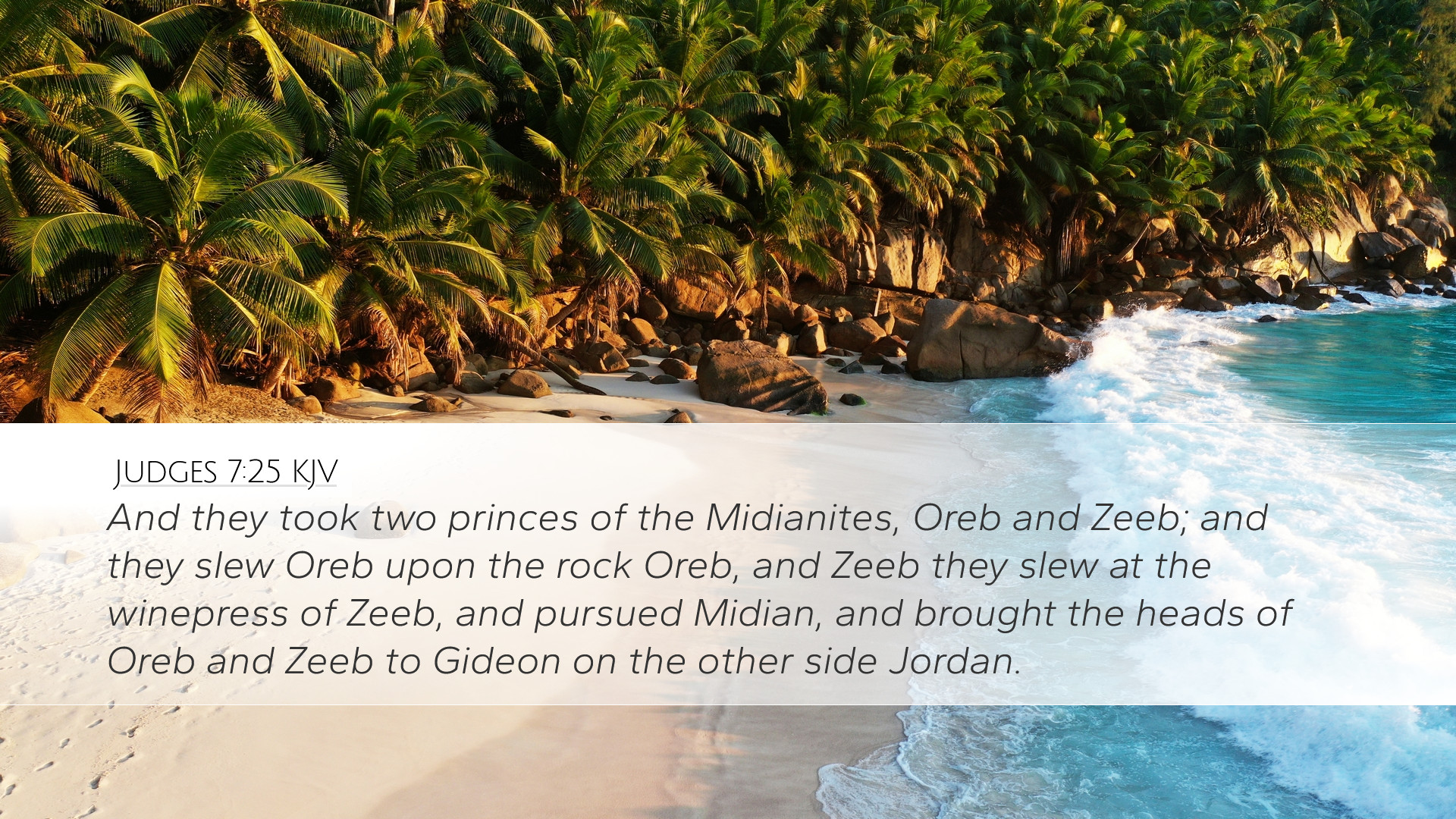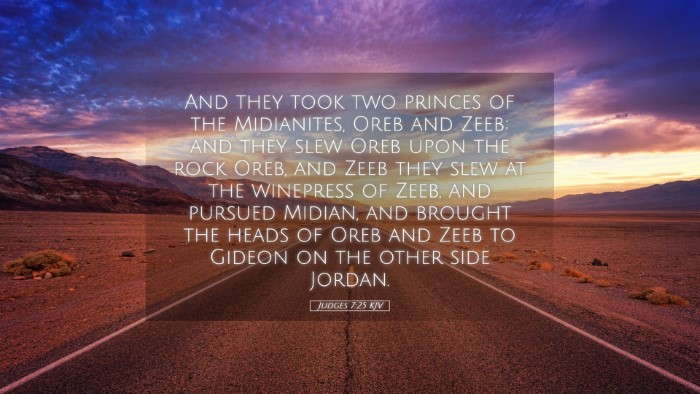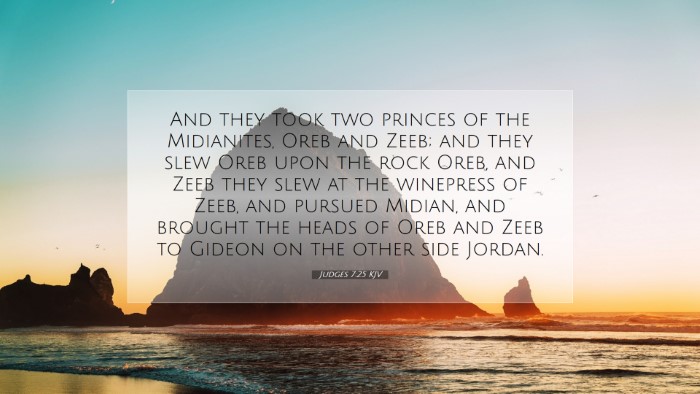Old Testament
Genesis Exodus Leviticus Numbers Deuteronomy Joshua Judges Ruth 1 Samuel 2 Samuel 1 Kings 2 Kings 1 Chronicles 2 Chronicles Ezra Nehemiah Esther Job Psalms Proverbs Ecclesiastes Song of Solomon Isaiah Jeremiah Lamentations Ezekiel Daniel Hosea Joel Amos Obadiah Jonah Micah Nahum Habakkuk Zephaniah Haggai Zechariah MalachiJudges 7:25
Judges 7:25 KJV
And they took two princes of the Midianites, Oreb and Zeeb; and they slew Oreb upon the rock Oreb, and Zeeb they slew at the winepress of Zeeb, and pursued Midian, and brought the heads of Oreb and Zeeb to Gideon on the other side Jordan.
Judges 7:25 Bible Commentary
Commentary on Judges 7:25
Judges 7:25 states, "And they took two princes of the Midianites, Oreb and Zeeb; and they slew Oreb upon the rock Oreb, and Zeeb they slew at the winepress of Zeeb, and pursued Midian, and brought the heads of Oreb and Zeeb to Gideon on the other side Jordan." This verse marks a pivotal moment in the narrative of Gideon's campaign against the Midianites, and it encapsulates themes of victory, divine justice, and the significance of leadership in biblical history.
Contextual Background
The book of Judges narrates a cycle of Israelite rebellion against God, oppression by foreign nations, repentance, and deliverance. Gideon, chosen by God to liberate Israel from the Midianites, represents the deliverance aspect of this cycle. Judges 7 recounts Gideon's strategic approach as he leads a small group of 300 men against a vast Midianite army.
Analysis of Key Themes
-
Divine Strategy:
Gideon’s success in defeating the Midianites stems from following God’s unconventional strategy. As Matthew Henry points out, the Lord intentionally reduced Gideon's forces to emphasize the divine nature of the victory. This act serves to demonstrate that battles are won not by human strength but by divine intervention.
-
Symbolism of Oreb and Zeeb:
The killing of Oreb and Zeeb—whose names mean "owl" and "wolf," respectively—symbolizes the crushing of evil powers within the land. Albert Barnes notes the significance of slaying these princes at notable places: "Oreb upon the rock Oreb, and Zeeb at the winepress of Zeeb." This suggests that the locations are as important as the actions, representing God’s power over the very symbols of their oppression.
-
Leadership and Justice:
Gideon’s decisive leadership is highlighted as he leads his men to pursue the Midianite forces. Adam Clarke remarks that the delivery of the heads of Oreb and Zeeb to Gideon signifies the completion of justice for the Israelites. Their victory not only serves as recompense against their enemies but also reinforces Gideon’s leadership as established and divinely ordained.
-
Impact on Israel:
The defeat of the Midianite princes had a profound psychological impact on the Israelites. According to Henry, it reinforced their faith in God’s power, thus rejuvenating their spirit after years of oppression. The act of bringing the heads back serves as a tangible reminder of God’s deliverance.
Theological Insights
-
God’s Sovereignty:
The text illustrates that God is sovereign over history and nations, orchestrating events to achieve His purposes. The defeat of Oreb and Zeeb represents not only physical victory but also a declaration of God’s authority over the gods of Midian.
-
Unity in Pursuit:
Gideon’s men, although few, acted in unity and obedience to divine direction. This unity is essential in the accomplishment of God’s will, echoing the New Testament theme found in 1 Corinthians 1:10 regarding the importance of being united in purpose.
-
Legacy of Courage:
The actions of Gideon and his men serve as an example of courageous faith and obedience in the face of overwhelming odds. This resonates with the call for believers today to trust in God’s guidance and power when facing their battles.
Reflections for Pastors and Theologians
The lessons from Judges 7:25 provide rich material for pastoral teaching and theological reflection:
-
Empowerment through God:
Pastors can draw from Gideon's example to empower their congregations, highlighting the importance of relying on God rather than worldly measures of strength or success.
-
Encouragement in Trials:
This passage serves as a reminder to believers that divine intervention is possible even in dire situations and that God can use seemingly inadequate resources to achieve great victories.
-
Justice and Righteousness:
The theme of divine justice runs throughout this narrative, which provides ample ground for discussing God’s moral order and His ultimate justice in human affairs.
Conclusion
Judges 7:25 encapsulates a moment of significant victory in Israel's history, serving not only as a historical account but also as a rich source of theological reflection. The narrative emphasizes the importance of divine guidance, the nature of true leadership, and the certainty of God's deliverance. For pastors, students, and scholars, this verse invites a deeper engagement with the themes of faith, obedience, and the sovereignty of God over the affairs of humankind.


